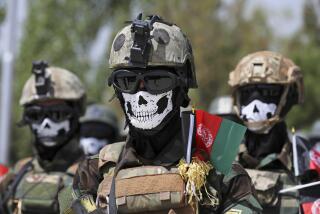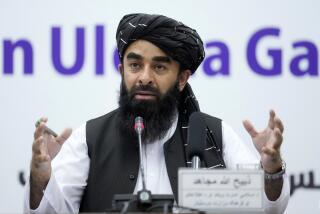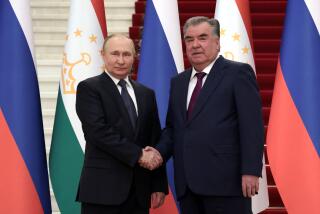Foes `on their heels,’ U.S. says
Four weeks into the bombing of Afghanistan, U.S. Defense Secretary Donald Rumsfeld said Sunday that the attacks had weakened the Taliban’s hold on the country and the U.S. is making “measurable progress” in the war on terrorism.
“The Taliban is not really functioning as a government as such,” said Rumsfeld, who was on a four-day, five-nation trip to Central Asia to cement support for the U.S.-led campaign. “They are not making major military moves. They are pretty much in static positions.”
In the United States, Gen. Richard Myers, chairman of the Joint Chiefs of Staff, said that more Special Forces troops had been deployed in Afghanistan in the past few days. They will work with rebel forces in targeting Taliban troops and members of Osama bin Laden’s al-Qaida terrorism network, he said.
“The more teams we get on the ground, the more effectively we’ll bring air power to bear on the Taliban lines,” Myers said on NBC’s “Meet the Press” program.
The U.S. may be able to use air bases in Tajikistan for the helicopter-borne Special Forces and to launch bombing raids against the Taliban. Tajikistan and the United States reportedly have reached a tentative agreement on military cooperation that could lead to U.S. air strikes from bases in the nation neighboring Afghanistan.
A U.S. inspection team has arrived there to examine three former Soviet bases to see whether they still are usable.
Myers and Rumsfeld spoke as American fighters and B-52 bombers pummeled four key cities in northern Afghanistan for seven hours in an apparent attempt to lay the groundwork for an offensive by the rebel Northern Alliance. But an alliance push toward the strategic city of Mazar-e Sharif was reported to be faltering hours after it began.
Despite reports that a major rebel offensive could be imminent, U.S. officials cautioned that might not be the case.
“I don’t know that I’d want to characterize the situation right now as saying we should be forward in the saddle and waiting for ground operations by the Northern Alliance, or a major effort by the Northern Alliance, in the next few days,” Gen. Tommy Franks, head of the U.S. Central Command, said on ABC’s “This Week.”
Asked if he would rule out a major deployment of ground forces against the Taliban, Franks replied, “Absolutely not.”
Some officials have expressed disappointment in the Northern Alliance’s failure to take territory from the Taliban despite the intensity of the U.S. bombing campaign. But Myers said that despite the lack of visible progress and the onset of winter, the campaign is going as expected.
“The Taliban are on their heels,” Myers said. “We have the initiative. ... I’d rather be in my position than theirs right now.”
Myers said the U.S. would continue to supply the rebels through the winter. “We’re settling in for the long haul,” he said.
Preparing for second phase
After four weeks of bombing, the U.S. military is girding itself for the second and most complex phase of its campaign. The first phase relied exclusively on air strikes. The second is supposed to make considerable use of U.S., and eventually British, special operations forces.
The number of U.S. troops in Afghanistan is believed to be 100 to 200 and probably includes Green Berets, Army commandos who specialize in advising foreign forces. Rumsfeld said last week that he hoped to at least triple the number of Special Forces troops in the country but that efforts to deploy them had been stymied by bad weather and, in one case, ground fire.
Northern Alliance spokesmen said they had launched a three-pronged offensive south of Mazar-e Sharif in a province bordering Uzbekistan, beginning the attack after the U.S. softened Taliban positions with heavy bombing. But within hours, the rebels said one of the opposition columns had bogged down.
Nonetheless, Rumsfeld told reporters in Uzbekistan that the war is going well.
“We believe we’re proceeding at a pace that is showing measurable progress,” Rumsfeld said. Although the Taliban still packs a military punch, he said, it has been crippled by the raids.
After meeting with Pakistani President Pervez Musharraf, Rumsfeld flew to India on the last leg of his trip. The U.S. is concerned that escalating tensions between nuclear-armed foes India and Pakistan over the disputed Kashmir region could undermine the effort against Afghanistan.
In Damascus, Syria, senior officials of Arab nations said bin Laden, suspected in the Sept. 11 suicide hijackings in the United States, is waging a war against the world.
The Saudi fugitive “does not speak for Arabs and Muslims,” said Amr Moussa, secretary general of the Arab League.
Diplomatic negotiations are to continue this week in Washington, where President Bush plans to meet with several foreign leaders in an attempt to maintain the coalition supporting the U.S. raids. The leaders set to visit the White House include Algeria’s Abdelaziz Bouteflika, India’s Atal Behari Vajpayee and Britain’s Tony Blair. Next weekend, Bush will visit the United Nations, where he will confer with several more heads of state.
In London, Blair dined with several key European leaders Sunday and discussed the war on terrorism, his office said.
The dinner included Blair, French President Jacques Chirac, German Chancellor Gerhard Schroeder, Italian Prime Minister Silvio Berlusconi and Spanish Prime Minister Jose Maria Aznar, all of whom have offered military support for the campaign in Afghanistan.
Prime Minister Guy Verhofstadt of Belgium, president of the European Union, also attended, along with EU foreign and security policy chief Javier Solana, Dutch Prime Minister Wim Kok and French Prime Minister Lionel Jospin.
Blair told his guests about his trip last week to the Middle East, aimed at shoring up Muslim support for the military campaign and rekindling the Israeli-Palestinian peace process.
Top U.S. military officials appearing on Sunday talk shows echoed Rumsfeld’s assessment that the campaign is going as expected despite a lack of visible victories. They insisted the Afghan winter would hurt the Taliban more than U.S. or opposition forces.
“Let me assure people that we’re going to fight right through the winter,” Myers said. “The winter is not going to stop us from doing what we have to do.”
The U.S. has been supplying the Afghan opposition with ammunition, food and blankets, Myers said, in contrast to the Taliban’s depleted stocks.
“What’s left for the Taliban is what they have on their back and what they have stored in caves and other places around Afghanistan, which we don’t think is very much,” he said.
‘They chose the time’
Myers insisted the United States would not be deterred during the upcoming Islamic holy month of Ramadan and said terrorists had brought the attacks on themselves.
“We didn’t choose that time,” he said. “They chose the time that this war was going to start, and so we’re going to proceed on this global war on terrorism.”
Franks sounded less definitive, saying the U.S. would consult with its allies before deciding what to do. “We’d be awfully foolish not to listen to people who have joined with us in this campaign,” he said.
That may not be enough to satisfy Pakistan, whose leaders clearly are nervous about the possibility of fighting during Ramadan, beginning in mid-November.
Musharraf warned over the weekend that bombing through Ramadan would have “a huge negative fallout.” But he also made clear he would not ask the U.S. to halt the campaign. “You can’t leave objectives halfway,” he said.
U.S. officials took issue with a report in the New Yorker magazine about the commando raid into Afghanistan on Oct. 20. The magazine said that contrary to Pentagon reports that the operation had been a resounding success, U.S. forces had met stiff resistance and 12 soldiers had been wounded, three of them seriously.
Myers denied that. “There was no resistance,” he said. “The Taliban were in complete disarray.”
Franks added that while some soldiers may have been hurt by the rough terrain, “We had no one wounded by enemy fire.”
Also Sunday, the Taliban reported that American relief worker John Bolton died in Afghanistan. A State Department official said, “We have nothing on that.”
More to Read
Sign up for Essential California
The most important California stories and recommendations in your inbox every morning.
You may occasionally receive promotional content from the Los Angeles Times.









